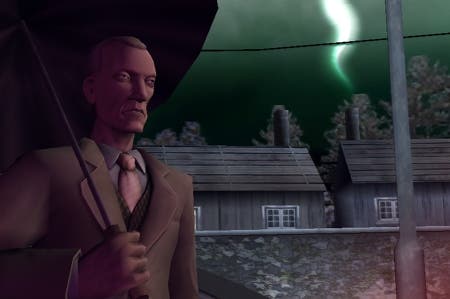Retrospective: Second Sight
Look again.
It fits that a game about precognition should be so ahead of its time. Playing through Free Radical's psychic-themed stealth shooter today is to tick off a checklist of features big and small that have since become vogue. And yet, in other ways, Second Sight arrived just too late - a misadventure born of unlucky scheduling and scuffles with publishers that led to it launching against the superficially similar Psi-Ops and then being overshadowed by 2004's heavy hitting sequels to Halo and Half-Life.
Imperfect though it is, Second Sight pips those games to the mark in some striking innovations. You play as John Vattic, an escaped mass-murdering mental patient, imbued with incomprehensible powers and plagued by flashbacks to a military operation. Vattic's telekinesis offered physics manipulation before Half-Life 2 made it cool, and as he unravels the conspiracy of his incarceration, he's joined by Jayne - a female companion as self-possessed and sympathetic as Alyx Vance.
Characters clip into cover, peering around and over it to fire in a way that has become de rigueur following the success of Gears of War. Throughout, there's a smattering of minor technologies that have received adulation in other more successful titles: camera within camera pictures, interactive computer screens a la Doom 3, TV monitors showing security feeds from elsewhere in the level, destructible cover, cloth physics and ragdoll animation. It even satisfies Reddit's current obsession with foot-to-floor contact.
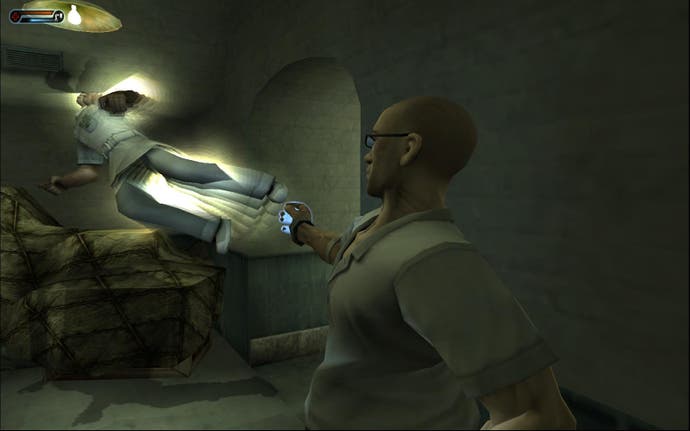
Some of its innovations prove hard to top, even now. Second Sight sports some of the most expressively animated characters in gaming - emoting with tremendous subtlety and range. Despite the clear polygon limit, nothing's beyond those cannily crafted animation rigs, delivering everything from from cool scepticism and wounded pride to bewildered terror and pity. Even the mo-capped mastery of Nathan Drake would have trouble matching the emotional clarity of Second Sight's caricatured cast.
Rarer still, Second Sight is a rich narrative-led thriller, peopled by well-crafted characters and given a narrative structure that delivers a stomach-swivelling twist, meshing mechanics and meaning in a way that only Bioshock has managed to top. Throughout the game, action moves between the amnesiac Vattic's attempts to escape confinement and, via debilitating fragmentary flashbacks, to the military operation that led up to it. As the game progresses, however, inconsistencies between these sections begin to emerge - characters are reported dead only to be found alive and well, recorded events shift and change.
The player might suspect some sort of time travel, but the actual revelation is far neater: Vattic isn't experiencing flashbacks at all, but flashforwards, envisaging possible futures that he then alters when returned to the military operation in the present. It's an inversion that gains elegant significance in the game's final levels, which ricochet him through the many possible futures in which he has failed to save his squadmates, Jayne or himself. Succumb to gunfire during the mission and a cutscene reveals the newly-forged present to which Vattic dooms himself, held in restraints and under interrogation, each post-script revealing different failures.
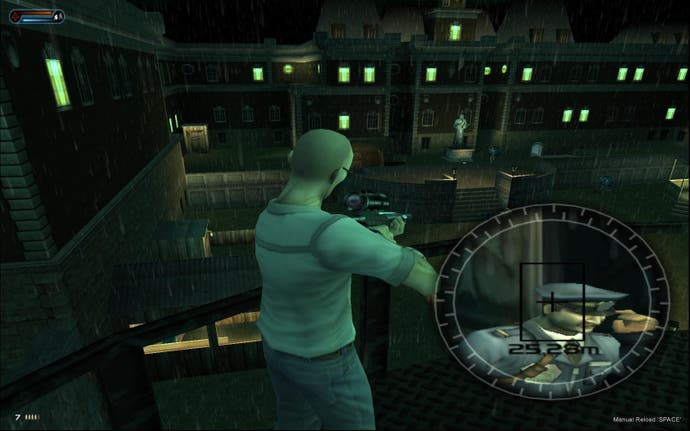
Vattic himself is written with uncommon complexity. He's reasonably sympathetic, but chippy, prissy and somewhat vain. The trauma of his imprisonment unleashes another side to his character: driven and vengeful. His deeply lined face with its thin mouth and heavy-lidded eyes does not conform to Hollywood hero stereotypes, but it's alive with intelligence, brow furrowing, lips pursing in momentary rumination, eyes flickering in movement.
The supporting cast are more loosely drawn, but not without their own flourishes - each member of Vattic's squad is a colourful creation, lent solidity by expert caricature and deft voice acting. Jayne is an unusual vocal choice, a strident, distinctive alto courtesy of actress Lynsey Beauchamp - and, like Alyx Vance, she defies the prevailing trend of caucasian leading characters. She's a far more vulnerable creation than Alyx, however, and when you spring her from an asylum during a flashforward, she takes on a role of helpless passivity, following only when you command and cowering from combat.
Such escort sections end up being frustrating thanks to capricious checkpointing and unsporting enemy spawns, but the elaborate, multi-stage puzzles within them show a clear debt to Ico's solemn pace and dramatic sense of scale. Elsewhere the discerning tastes of the developers are evident as the game's focus shifts among its mechanics. At its core is Metal Gear Solid's stealth, but there are flashes of other games, too - not least GoldenEye, a game on which Free Radical's founders had worked while employed at Rare.
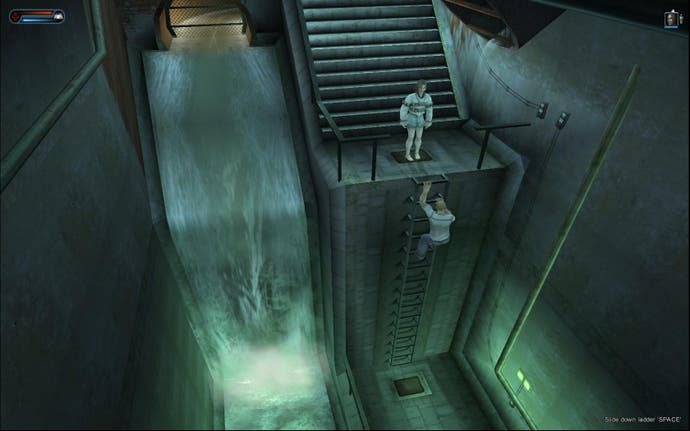
Given its noble heritage, prescient innovation and narrative triumphs, you'd think Second Sight would have knocked it for six. But the game industry is a fickle mistress. Originally slated to be Free Radical's first title on the nascent PlayStation 2, unexpected events enforced a quick switch of gears. With a delay to the release of Sony's console in the offing, Free Radical were tempted by a new opportunity: to deliver a game at launch. Second Sight's ambitions outstripped that development schedule so it was temporarily shelved. TimeSplitters was the welcome result, but a regrettable side-effect was that Second Sight then fell out of favour with prospective publisher Eidos, who were eager to crowbar demons into the game, and then Activision, who had allegedly taken against the three things Free Radical represented: UK development, independence and privately held IP.
Codemasters came to the rescue. But it was a marriage of convenience rather than a whirlwind romance, as Free Radical co-founder David Doak recalls in an interview with Rich Stanton (part of which forms Rich's excellent and comprehensive history of Free Radical).
"We desperately needed someone to publish it, and they needed filler," says Doak. "That was it. Their Lara was Colin McRae. Every publisher has one. At that time [Codemasters] had their own problems and the game came to them nearly finished, so they wanted to get it out as quickly as possible on a shoestring. We couldn't spend the time we wanted to on the controls, really. They didn't have the muscle to put it out.
"It was unfortunately timed," continues Doak. "Psi-Ops came out at around the same time, and that blew our US sales out of the water. I mean what are the chances of people making two Asteroids Hit the Earth movies in one year? Must be a million to one! But there you are. And you could do more violent things in [Psi-Ops] like explode people's heads. The controls were a little more fluid, it was a bit more bonkers. That caused us trouble. Second Sight reviewed well in some places, alright in others. Not as well as Halo. It would have made a great movie, too."
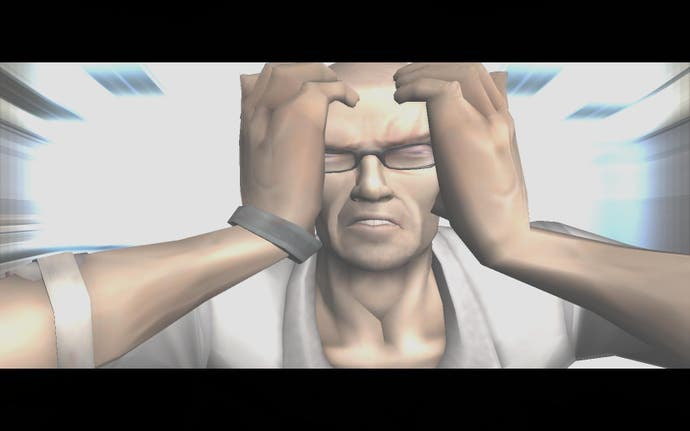
Circumstances may not have been opportune for its release but the game wasn't without its own flaws, as Doak notes. "It was a lot harder to make than we anticipated. We'd never made a third-person camera game and we learned the hard way about the gnarly things you have to think about. And more cutscenes! It had no multiplayer element, which may have hurt it, it was completable in a short amount of time. If I could go back and change anything about it I'd spend more time refining the controls. We made it too clunky."
Then there was the fact you couldn't invert the controls. "Everyone mentions the invert thing," says Doak, ruefully.
And since we're dwelling on the negative: Second Sight's save system is churlish, the level of challenge erratic and, perhaps most crucially, its visual style was designed to scale down to Gamecube at a time when the likes of Halo 2 and Half-Life 2 were wowing audiences with the cutting edge. The PC port, which is probably the most convenient way to experience the game now, struggles with the lock-on aiming system - although at least the resolution can be tweaked to suit modern monitors with some changes to the config file.
These are venial flaws, especially given the game's unheralded successes in other areas, but it's easy to see why the game was not as rapturously received as it should have been. It's a misfortune that has impoverished would-be players, the developers and the industry all. While the medium has made uniform advances in control, user experience and visual fidelity, intelligent and emotive plots and richly realised characters have remained much rarer achievements. If more people had played the exemplary Second Sight, they, like Vattic, might just have been granted a glimpse of a very different future.
